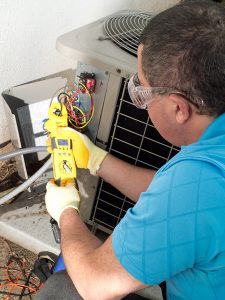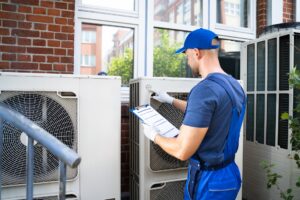
Your air conditioner doesn’t quite feel the same as it used to. It’s running for longer and your house isn’t getting cool as quickly. What gives?
It could be a number of things, but one major problem could be a freon leak. Freon is the brand name for a chemical blend that’s used as a refrigerant in the lines of your AC. In fact, low refrigerant levels are one of the common reasons AC isn’t cold that homeowners encounter during the summer months.
But can you fix a freon leak in an air conditioner, or does it spell certain doom for your home cooling system? Let’s talk about that.

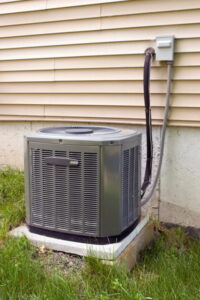 Go outside your house and look at the condenser cabinet for the central air conditioner. You’ll notice that it’s placed onto a concrete slab, rather than just set on the ground. This is because the condenser is a heavy object and it would start to sink right down into the ground if it wasn’t put on a solid foundation. Laying down a concrete pad is a critical part of putting in the first AC for a new house.
Go outside your house and look at the condenser cabinet for the central air conditioner. You’ll notice that it’s placed onto a concrete slab, rather than just set on the ground. This is because the condenser is a heavy object and it would start to sink right down into the ground if it wasn’t put on a solid foundation. Laying down a concrete pad is a critical part of putting in the first AC for a new house. Here’s a common misunderstanding people often have about air conditioning systems: it’s normal for ice to appear on them, because it means the AC is doing an extremely good job of cooling the air.
Here’s a common misunderstanding people often have about air conditioning systems: it’s normal for ice to appear on them, because it means the AC is doing an extremely good job of cooling the air. As the hot months of summer in Brighton keep getting hotter, your air conditioner is most likely going to be working overtime to keep your home cool and comfortable. If you have had your air conditioner for a long time, you must have faced several issues over the years that require repairs. One fairly common issue that people face with their cooling systems is an inexplicable water leak from their ACs.
As the hot months of summer in Brighton keep getting hotter, your air conditioner is most likely going to be working overtime to keep your home cool and comfortable. If you have had your air conditioner for a long time, you must have faced several issues over the years that require repairs. One fairly common issue that people face with their cooling systems is an inexplicable water leak from their ACs.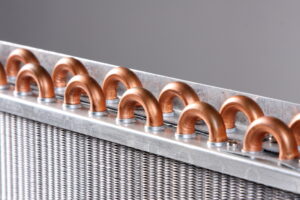 October usually means we a break from the heat (although there are always those sudden turns—you can’t take cooler weather for granted until it’s truly winter!). As you get ready for the change in seasons to settle in, it’s a good time to evaluate the performance of your
October usually means we a break from the heat (although there are always those sudden turns—you can’t take cooler weather for granted until it’s truly winter!). As you get ready for the change in seasons to settle in, it’s a good time to evaluate the performance of your 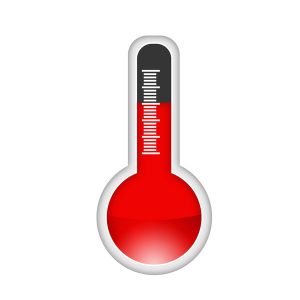 “Wait, my air conditioner can overheat?” You might not immediately think of the air conditioner as an appliance that might overheat, but this is a danger for any mechanical device that uses motors. When your AC overheats, it will cause its circuit breaker to trip, the same as other electrical appliances in your house that are connected to the electrical system.
“Wait, my air conditioner can overheat?” You might not immediately think of the air conditioner as an appliance that might overheat, but this is a danger for any mechanical device that uses motors. When your AC overheats, it will cause its circuit breaker to trip, the same as other electrical appliances in your house that are connected to the electrical system. When the heat and humidity of late summer start their relentless assault on your home and your family’s comfort, you’ll be glad you have a powerful central air conditioning system to man the battlements and keep the invading heat hordes from storming the walls.
When the heat and humidity of late summer start their relentless assault on your home and your family’s comfort, you’ll be glad you have a powerful central air conditioning system to man the battlements and keep the invading heat hordes from storming the walls. Your refrigerant-based air conditioning system doesn’t use water to cool down the air (that’s what swamp coolers do). But the process of evaporating cold refrigerant in the indoor coils of the air conditioner creates water moisture. So when you hear the sound of water dripping inside your AC, that’s part of the normal process of cooling your home. The air conditioner is getting rid of the moisture that built up.
Your refrigerant-based air conditioning system doesn’t use water to cool down the air (that’s what swamp coolers do). But the process of evaporating cold refrigerant in the indoor coils of the air conditioner creates water moisture. So when you hear the sound of water dripping inside your AC, that’s part of the normal process of cooling your home. The air conditioner is getting rid of the moisture that built up.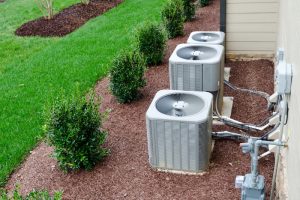 Air conditioners runs using motors and fans, so they can never run silently. However, the construction of standard split system air conditioners removes a great deal of the noise from the house by placing the compressor and exhaust fan outside. Inside the house, most of the sound will come from the indoor blower fan, water dripping from the evaporator coil, and the movement of air through the ventilation ducts.
Air conditioners runs using motors and fans, so they can never run silently. However, the construction of standard split system air conditioners removes a great deal of the noise from the house by placing the compressor and exhaust fan outside. Inside the house, most of the sound will come from the indoor blower fan, water dripping from the evaporator coil, and the movement of air through the ventilation ducts.